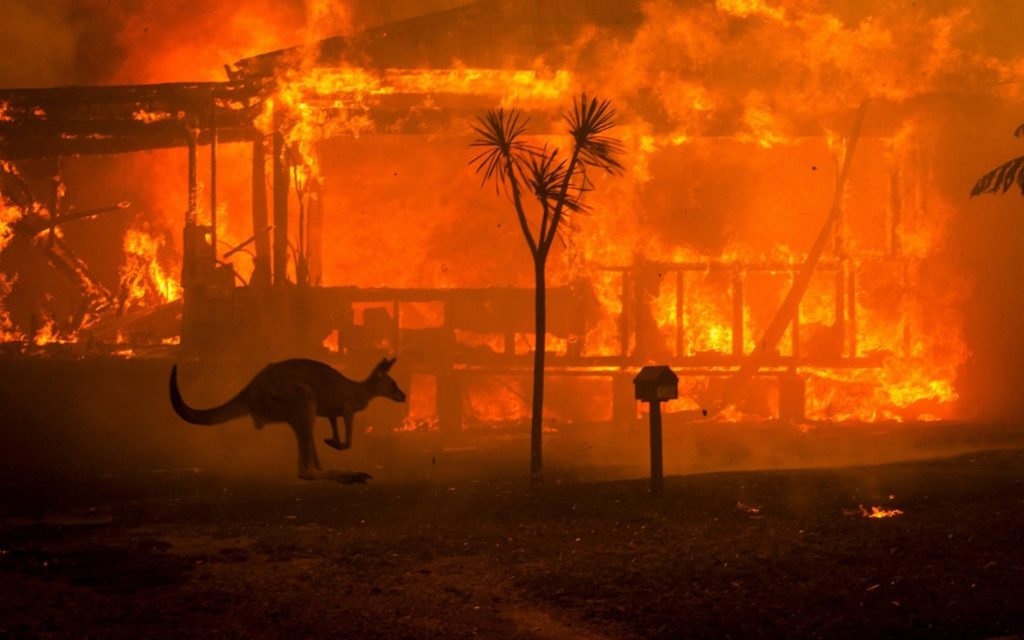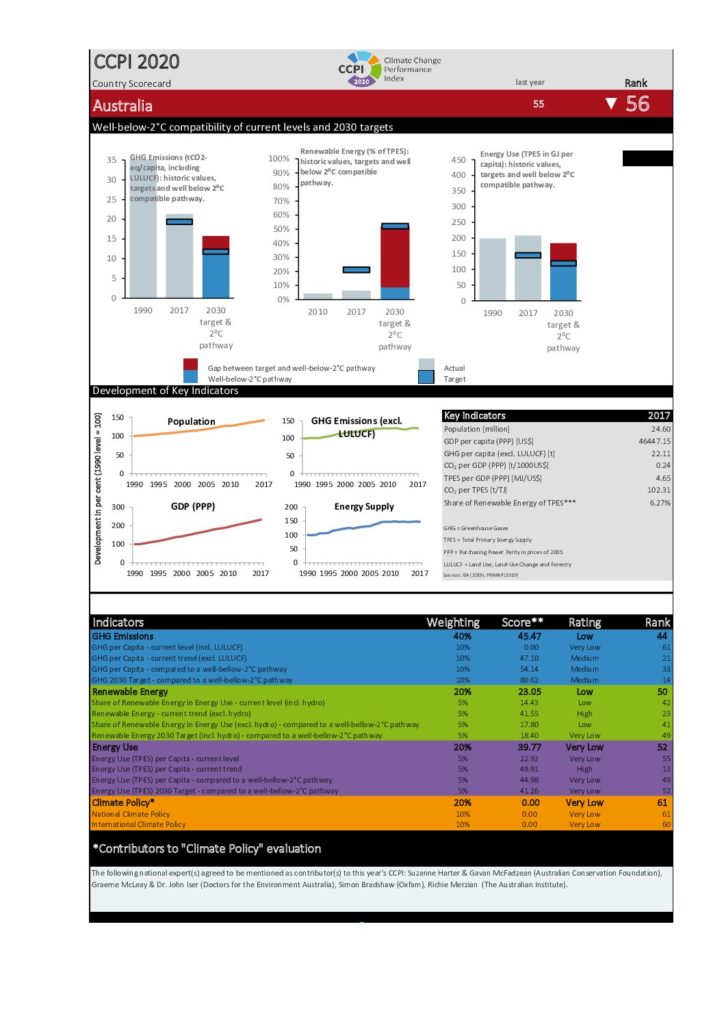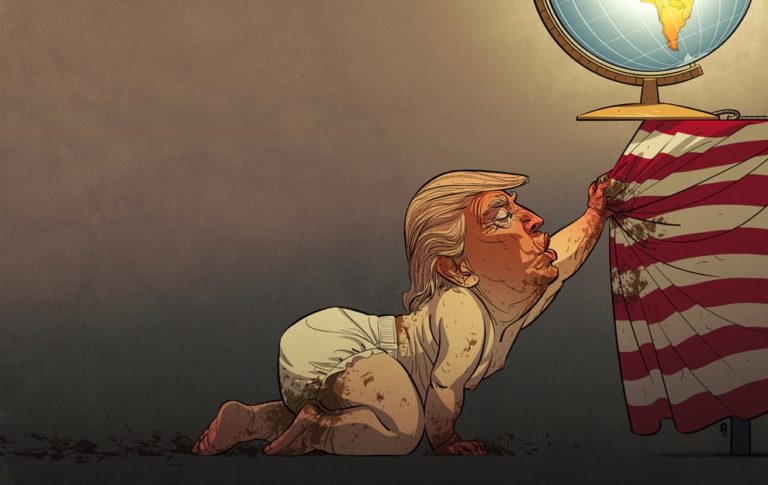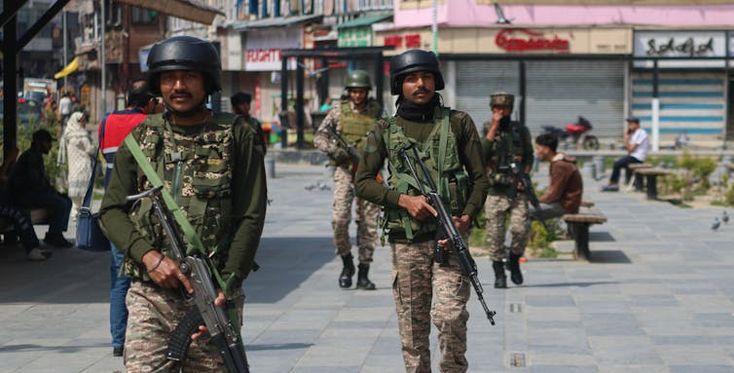

Photograph: Lukas Coch/AAP
The country is led by politicians who in one way or another deny either the science or are de facto denying it, and actively and wilfully opposing or obstructing climate policies. Bill Hare, CEO Climate Analytics
These are Australians waiting on the beach to flee into the ocean if the fire keeps coming. It’s the only ‘safe’ place they can find. pic.twitter.com/9jG98iBDzo
— Bill McKibben (@billmckibben) January 2, 2020
New Zealand glacier brown from Australian bush fires. They are some 2-3 000 km apart. (The browning will of course increase melting, since dark colours are more warmed by sunlight.) https://t.co/KYstx1XB30
— Gunnstein R’Lyeh 🌍🚴♂️ (@glye) January 2, 2020
The Guardian: Aboriginal people in Alice Springs say global heating threatens their survival
Cattle have stopped breeding, koalas die of thirst: A vet’s hellish diary of climate change
By Gundi Rhoades
Bulls cannot breed at Inverell. They are becoming infertile from their testicles overheating. Mares are not falling pregnant, and through the heat, piglets and calves are aborting.
My work as a veterinarian has changed so much. While I would normally test bulls for fertility, or herds of cattle for pregnancy, I no longer do, because the livestock has been sold. A client’s stud stock in Inverell has reduced from 2000 breeders to zero.
I once assisted farmers who have spent their lives developing breeding programs, with historic bloodlines that go back 80 years. These stud farmers are now left with a handful of breeders that they can’t bear to part with, spending thousands keeping them fed, and going broke doing it.
Cattle that sold for thousands are now in the sale yards at $70 a head. Those classed as too skinny for sale are costing the farmer $130 to be destroyed.
They are all gone and it was all for nothing. The paddocks are bare, the dams dry, the grass crispy and brown. The whole region has been completely destocked and is devoid of life.
For 22 years, I have been the vet in this once-thriving town in northern NSW, which, as climate change continues to fuel extreme heat, drought and bushfires, has become hell on Earth.
Here, we are seeing extreme weather events like never before. The other day we had about eight centimeters of rain in 20 minutes. These downpours are like rain bombs. They are so ferocious that a farmer lost all of his fences, and all it did was silt up the dam so he had to use a machine to excavate the mud.
Most farmers in my district have not a blade of grass remaining on their properties. Topsoil has been blown away by the terrible, strong winds this spring and summer. We have experienced the hottest days that I can remember, and right now I can’t even open any windows because my eyes sting and lungs hurt from bushfire smoke.
For days, I have watched as the bushland around us went up like a tinderbox. I just waited for the next day when my clinic would be flooded with evacuated dogs, cats, goats and horses in desperate need of water and food.
The impact of the drought on wildlife is devastating to watch, too. Members of the public are bringing us koalas, sugar gliders, possums, galahs, cockatoos and kangaroos on a daily basis.
The koalas affect me the most. To see these gorgeous, iconic animals dying from thirst is too hard to bear. We save some, but we lose just as many.
The whole town is devastated. My business has halved. But with no horses to breed, no cattle to test and care for, what am I going to do? I have worked day and night to build a future for my family, but who would want to buy our property out here? Who would want to buy a vet clinic in a town where there are no animals to treat because it’s too hot and dry? Where the cattle become infertile from the 40-degree heat. All this on black, baked ground.
I am 53 years old. Can I start again?
Climate change for us is every day, and I am not suffering on the same level as my friends, my clients and the helpless animals I treat. As a veterinarian I am becoming more and more distressed, not just about the state of my town, but the whole world.
Personally, I have had weeks when I just cry. It just bloody hurts me. I also have times when I get really angry and I start to swear, which I have never done in my life.
I also have times when I think about the potential this country has to create a renewable future with clean, green energy, and end our reliance on fossil fuels.
You only have to look at how resilient our farmers are in the face of devastating, extreme weather conditions to understand that we can make a powerful, meaningful difference to our future.
The government has no idea what it’s like for us. It has no empathy. Its members don’t know how much it hurts when they just say yes to another coal mine.
I would invite Scott Morrison to come and see what life in Inverell is like. In case he chooses not to, I’ll paint this picture for the country and hope people can start to realise and understand the devastating impact climate change is having. I hope they will take a stand for the people, the places and the animals whose voices are too small for him to hear.
Gundi Rhoades is a veterinarian, scientist, mother, beef cattle farmer and member of Veterinarians for Climate Action.
Climate Change Performance Index 2020 (CCPI)
The CCPI is an independent monitoring tool of countries’ climate protection performance. It aims to enhance transparency in international climate politics and enables the comparability of climate protection efforts and progress made by individual countries.
- The ranking results are defined by a country’s aggregated performance in 14 indicators within the four categories “GHG Emissions”, “Renewable Energy” and “Energy Use”, as well as on “Climate Policy”, in a globally unique policy section of the index.
- The CCPI 2020 results illustrate the main regional differences in climate protection and performance within the 57 evaluated countries and the EU. Still, no country performs well enough in all index categories to achieve an overall very high rating in the index. Therefore, once again the first three ranks remain empty.
- In this year’s index, Sweden leads the ranking on rank 4, followed by Denmark (5) and Morocco (6). The bottom five in this year’s CCPI are Islamic Republic of Iran (57), Republic of Korea (58), Chinese Taipei (59), Saudi Arabia (60) and the United States (61), rated low or very low across almost all categories.
Australia (56)
Ranked 56th in this year’s CCPI, Australia with an overall very low rating remains under the bottom five performers. The country continues to receive very low ratings in the Energy Use category and ranks at the bottom of low performers in both the GHG Emissions and Renewable Energy categories. National experts observe a lack of progress in these areas with the government failing to clarify how it will meet the country’s insufficient 2030 emission reduction target and inaction in developing a long-term mitigation strategy. While the government is not proposing any further targets for renewable energy beyond 2020, it continues to promote the expansion of fossil fuels and in April 2019 approved the opening of the highly controversial Adani coalmine. Experts note that the new government is an increasingly regressive force in negotiations and has been criticised for its lack of ambition by several Pacific Island nations in the context of this year’s Pacific Island Forum. The dismissal of recent IPCC reports, the government not attending the UN Climate Action Summit in September, and the withdrawal from funding the Green Climate Fund (GCF) underpin the overall very low performance in the Climate Policy category.

About the CCPI
Published annually since 2005, the Climate Change Performance Index (CCPI) tracks countries’ efforts to combat climate change. As an independent monitoring tool, it aims to enhance transparency in international climate politics and enables a comparison of climate protection efforts and progress made by individual countries.
The implementation phase of the Paris Agreement enters a crucial phase in 2020, where countries are due to submit their updated Nationally Determined Contributions (NDCs). In light of this, the CCPI aims to inform the process of raising climate ambition. As a long-standing and reliable tool for identifying leaders and laggards in climate protection, the CCPI can be a powerful instrument to hold governments accountable for their responsibility to act on the climate crisis and of stimulating a race to the top in climate action.
Germanwatch, the NewClimate Institute, and the Climate Action Network publish the Index annually. The CCPI’s unique climate policy section, evaluating countries’ national and international climate policy performance, is only possible through the continued support and contributions of around 350-400 climate and energy experts. We express our gratitude to these experts and greatly appreciate their time, efforts and knowledge in contributing to this publication.




34 Comments
Pingback: slot demo 2023
Pingback: Best DMT vape pen shop Australia
Pingback: บุหรี่นอก
Pingback: mushroom chocolate bar reddit
Pingback: ดูฟุตบอลออนไลน์ฟรี LSM99
Pingback: ป้ายนครราชสีมา
Pingback: relaxing jazz coffee shop
Pingback: ซื้อหวยออนไลน์
Pingback: 웹툰 미리보기
Pingback: เสือมังกร lsm99
Pingback: spin238
Pingback: ทดลองเล่นสล็อต pp
Pingback: โปรแกรมพรีเมียร์ลีก
Pingback: แปลเอกสาร
Pingback: link alternatif superkaya88
Pingback: disposable
Pingback: ข้อดีของการเล่นสล็อตออนไลน์ผ่าน LSM99
Pingback: หวยดวงดี แทงหวยออนไลน์หลายแบบ เว็บหวยออนไลน์เว็บตรง
Pingback: swan168
Pingback: sell drugs
Pingback: sbo เว็บแทงบอล สมัครฟรี โปรโมชั่นเยอะ ปิดให้บริการแล้ว
Pingback: ทำความรู้จักกับค่ายเกม Play’n GO
Pingback: best free cams
Pingback: massage Bangkok
Pingback: my diery
Pingback: โปรโมชั่นฝาก 10 รับ 100
Pingback: wing888 ทางเข้า เว็บพนันที่ดีที่สุด
Pingback: Lottovip98
Pingback: bus ticket online
Pingback: Beer555 ทางเข้าแทงบอล SBOBET
Pingback: ปั่นสล็อต เว็บไหนดี โบนัสแตกง่าย
Pingback: ทางเข้าเว็บของค่าย FAFA คาสิโน สล็อต
Pingback: diaphragm pump
Pingback: 1xbet